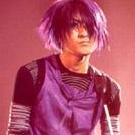-
Content Count
1452 -
Joined
-
Last visited
Single Status Update
-
Does anybody know what the proper romanization is for this release by Jakura? 空ヲ喰らフ吐陰. Help appreciated.
- Show previous comments 2 more
-
.thumb.jpg.0642fdb6da26c774b69025613ae64a8d.jpg)
@inartisticAre you sure about the ふ kana used to be representing the "U" sound? (う)? Because, from what I've read on the Japanese sound shifts, the は row Kana used to be pronounced with an F sound, and the pronunciation of ふ was the only one that stayed the same, wherewas the other Kana in the は row were
almost completely changed throughout history, and now kind of represents H sounds unless used as a particle. (Basically, the transition for, say the Kana へ would have been Pe > Fe > He/We/E (The We part obviously being obsolete) I'm not trying to correct you, or anything. I'm just wondering where you got your information from, because I'm curious to learn more, actually, since I read a lot about archaic forms of the Japanese language, since a lot of the Vkei vocalists I listen to pronounce things in older ways and use obsolete phonemes.
-

@AimiGen7Tbh my knowledge about the subject is only cursory--basically from trying to figure out song titles like seikun was. (I didn't even know about the “shifts” you mentioned! Pretty cool.) Here are a few links that mention it, and hopefully you can find something a bit more concrete.
http://www.sljfaq.org/afaq/historical-kana-usage.html
http://amaterasu.tindabox.net/guide/OJ.php
http://nihongo.monash.edu/j_oldkana.html-
Himeaimichu reacted to this
-
.thumb.jpg.0642fdb6da26c774b69025613ae64a8d.jpg)
@inartistic From what I see, the only source above that has any romaji (Romaji is pretty much the only way to represent the sound shifts xD) is the first source, and it assumes that ふ was once pronounced as Hu, which is quite incorrect. For some possibly complicated linguistic reason, all the "h" Kana were once pronounced with an F (as I mentioned earlier) and it just happened that while all the other Kana went through pronunciation shifts, now being stuck inbetween starting with an H sound, a W sound (in the case of は), or just being a plain vowel.
Though I will give credit where credit is due on the thing about the name Kaori once being spelled as and pronounced as Kawori. They're quite right on that.
But yeah, in essence, Japanese has never really had a "hu" sound.
I guess the best way to describe the Japanese sound shifts is with the Iroha poem. I'll put down the pronunciations and what time period they would be used in:
Old Japanese:
Iro Pa Ni Popeto,
Chirinuru Wo.Wa ka yo tare so
Tsune Naramu
Uwi no okuyama
Kepu koyete
Early Middle Japanese:
Iro Fa Ni Fofeto
Chirinuru Wo
Wa ka yo tare so
Tsune Naramu
Uwi no okuyama
Kefu koyete
Late Middle Japanese:
Iro ha ni hoheto
Chirinuru Wo
Wa ka yo tare so
Tsune Naramu
Uwi No Okuyama
Kefu Koyete
Early modern Japanese:
Iro wa ni woweto (In theory, it'd be like this, but in practice, the line at one point could probably have been Iro wa ni hoheto. The changes are gradual, so this is theoretically how it would have been, but not practically)
Chirinuru wo
Wa ka yo tare so
Tsune Naran
Uwi No Okuyama
Kyo Koyete (Some time during the middle Japanese period, some words with the ふ kana were being pronounced with a yo sound, sort of. IDK really how to explain it though)
Alternatively, Early Modern Japanese could have been also pronounced as:
Iro wa ni oeto
Chirinuri wo
Wa ka yo tare so
Tsune Naran
Ui No Okuyama
Kyo Koyete
And here is the modern pronunciation:
Iro Wa Ni Oedo
Chirinuru O
Wa Ga Yo Dare Zo
Tsune Naran
Ui No Okuyama
Kyo Koete



